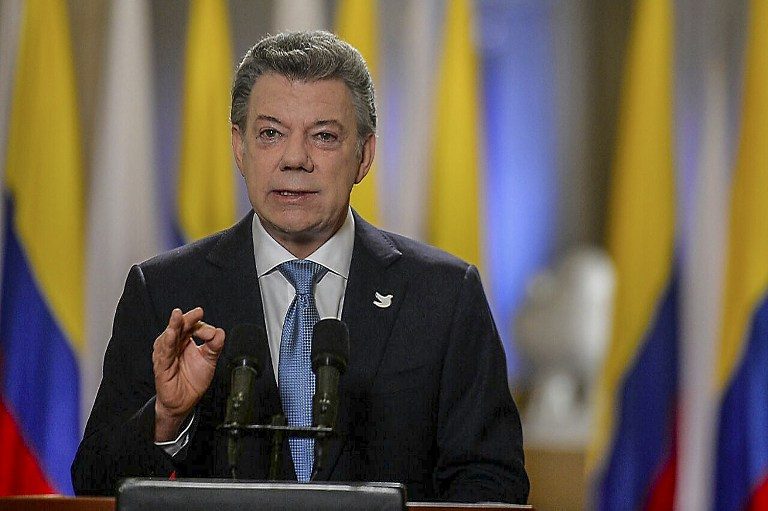SUMMARY
This is AI generated summarization, which may have errors. For context, always refer to the full article.

BOGOTA, Colombia (UPDATED) – Colombia’s government and FARC rebels signed a controversial revised peace accord Thursday, November 24, to end their half-century conflict, set to be ratified in Congress despite bitter opposition.
President Juan Manuel Santos and guerrilla leader Rodrigo “Timochenko” Londono signed the new deal with a pen made from a spent bullet, in a low-key ceremony in the capital Bogota.
The original deal – signed with great fanfare in September – was rejected by voters in a referendum last month, a shock upset that sent negotiators back to the drawing board.
The new plan bypasses a vote by the Colombian people, against bitter opposition from critics.
They say the revisions are only cosmetic and will still grant impunity for war crimes committed by the Revolutionary Armed Forces of Colombia (FARC).
Santos, who won this year’s Nobel Peace Prize for his efforts to end the conflict, said the new deal was better than the original.
“It includes the hopes and observations of the vast majority of Colombians,” he said after signing it.
“We all know in our souls that the cost of the armed conflict is too high.”
Fragile ceasefire
The deal was immediately sent to Congress, where it is expected to pass after being debated next week. Santos and his allies hold a majority in the legislature.
The government and FARC both say they are under pressure for fear that their fragile ceasefire could break down.
A recent wave of alleged assassinations in conflict zones has added to calls to seal a deal fast.
But an aftermath of discord and uncertainty appears likely as opponents promised to keep resisting the peace plan, including with street protests.
“The country has spoken. It has said, ‘Yes to peace, but without impunity,'” said top opponent Alvaro Uribe, a conservative ex-president and senator.
“What we have here remains total impunity,” he told RCN television.
Speaking later in the Senate, he called for another referendum on some of the contested “basic issues” in the deal.
Opposition objections
The government and FARC negotiators’ redrafted version of the deal includes concessions from the rebels on issues such as reparations for victims.
But Uribe complains it still ignores key demands, notably on punishing FARC leaders for the killings and kidnappings blamed on the group.
Under the deal, the Marxist rebels would disarm and become a political party.
The deal allows non-custodial sentences for convicted FARC members.
Uribe and his allies demand tougher punishments and say rebel leaders guilty of war crimes should not be allowed to run for office before completing their sentences.
A survey by pollster Datexco published on Wednesday found that 58% of people want more revisions to the deal.
Bypassing voters
Congress will open a live televised debate on the deal from next Tuesday.
On the streets of Bogota, passerby Overnis Diaz welcomed the agreement.
“We have lived through a war of more than 50 years. We want no more bloodshed,” he said.
But another local, Dayanna Gil, said: “It should be approved through a popular vote… We should all have a say.”
Disarmament in months
Santos said that five days after the deal is approved, the FARC rebels will begin gathering in demobilization zones and will hand over their weapons to the United Nations within five months.
UN Secretary General Ban Ki-moon hailed Thursday’s deal.
“The violent incidents that have taken place recently in conflict-affected areas underscore the relevance of many of the commitments contained in the agreement and the urgency of putting them into effect,” his spokesman said in a statement.
The Colombian conflict has killed at least 260,000 people and displaced seven million since it erupted in 1964, according to the authorities.
It has drawn in various left- and right-wing armed groups, state forces and gangs.
Recent efforts by the government to start talks with the second-biggest rebel group, the leftist ELN, have failed due to disputes over hostages. – Rappler.com
Add a comment
How does this make you feel?
There are no comments yet. Add your comment to start the conversation.